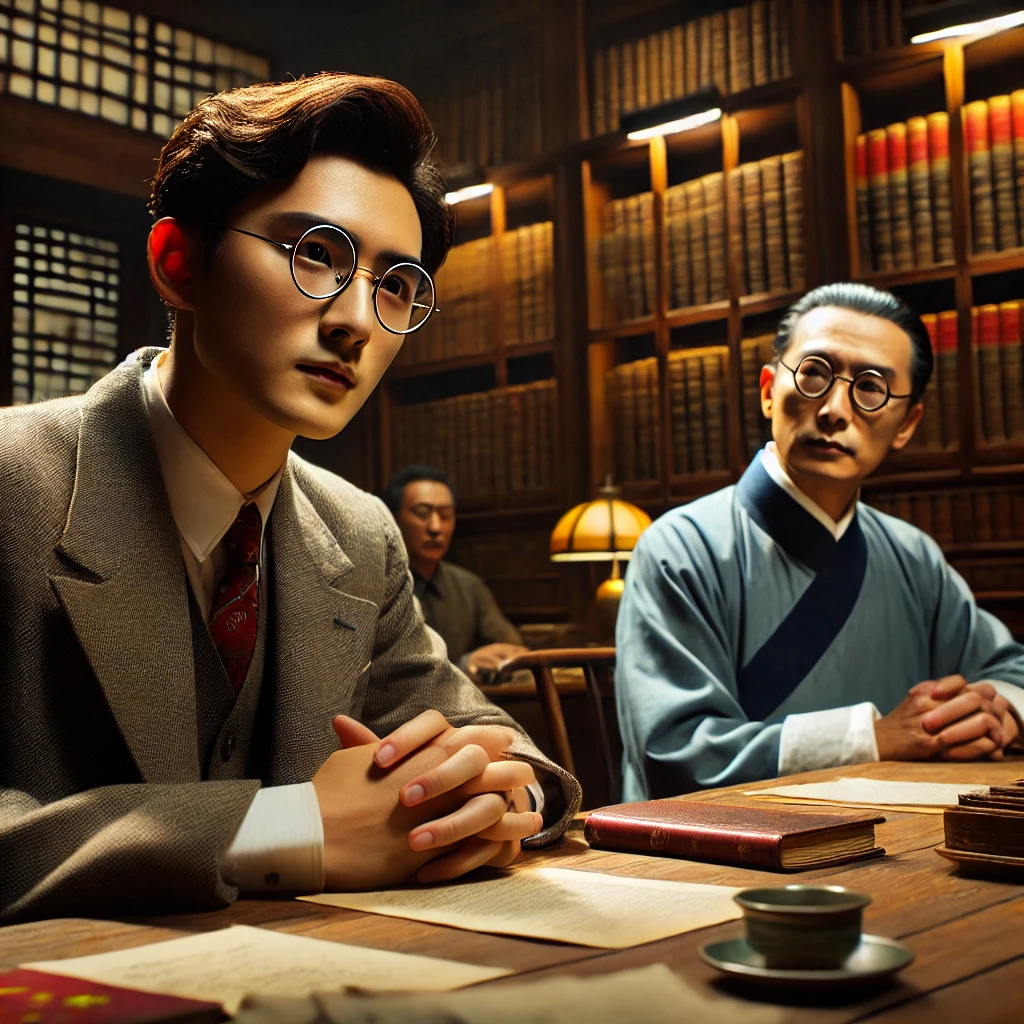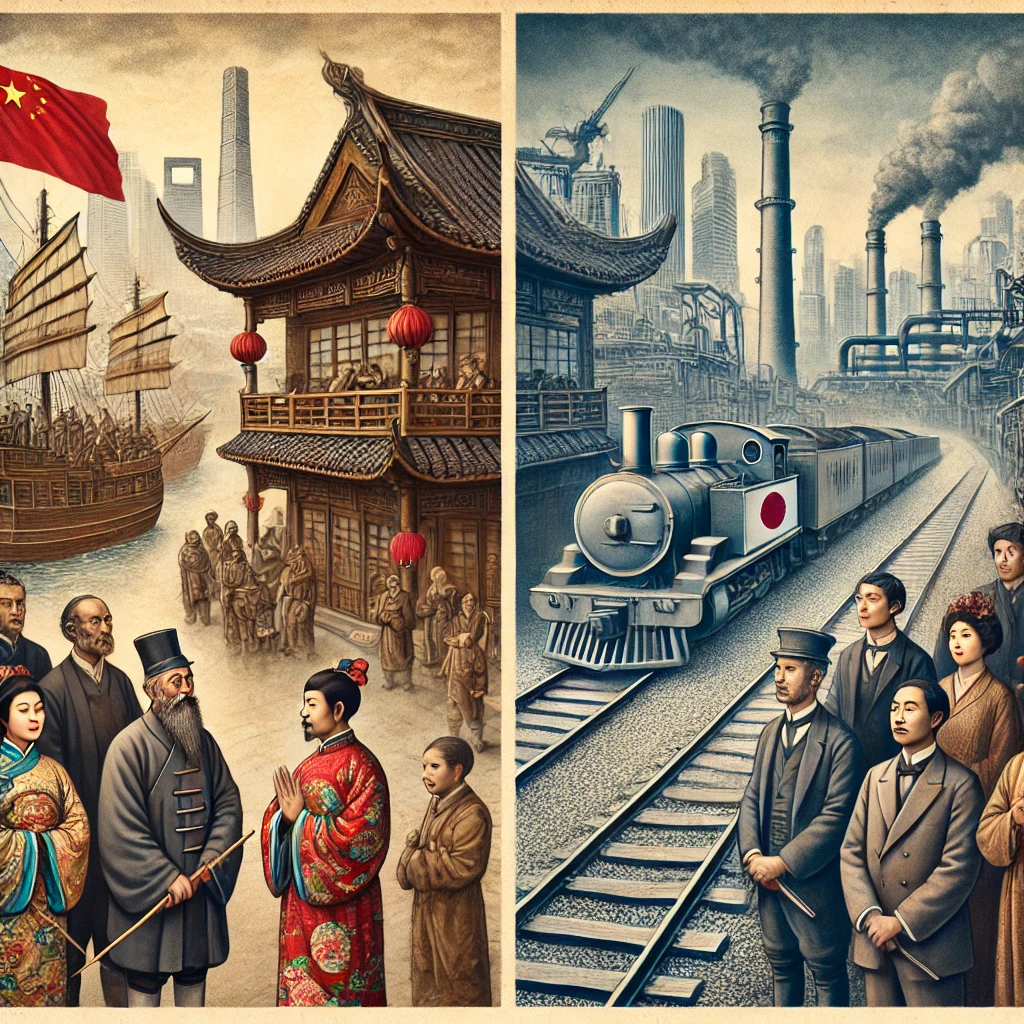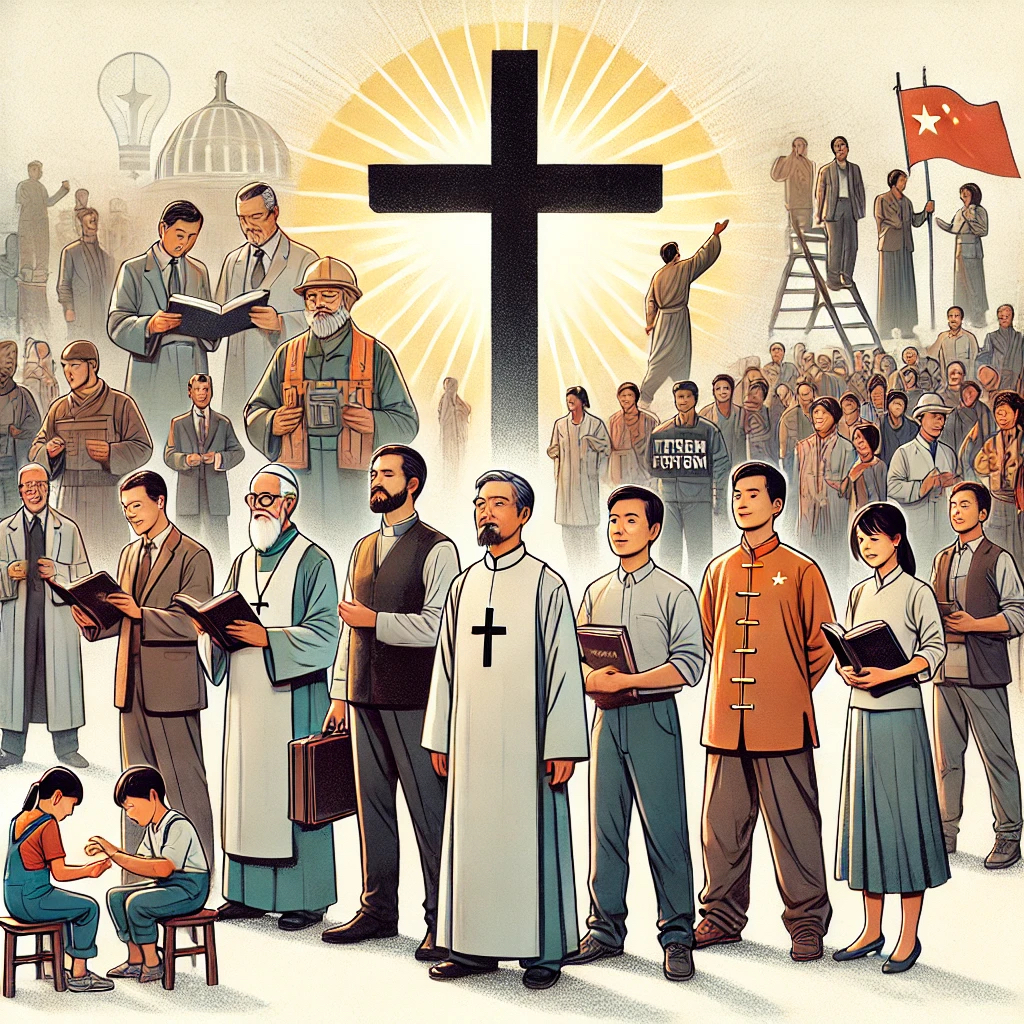导读:“梁胡之战”是指1930年梁漱溟与胡适围绕“中国根本问题”展开的著名思想论战,集中体现了近代中国知识分子的救国路径分歧。当时中国内忧外患,1930年,胡适发表《我们走那条路?》(从文章内容看,这里的“那”字实为“哪”字),随后梁漱溟在公开信中质问胡适为何不认同“帝国主义与军阀是中国最大敌人”,而将症结归为贫穷、疾病、愚昧等内部问题。胡适回应称,日本同样受列强压迫却能崛起,中国困境主因是自身积弊,如鸦片泛滥、贪污横行等。梁漱溟则强调帝国主义通过经济侵略加剧中国贫困,且军阀割据实为列强操控结果。这场论战折射出文化保守主义与全盘西化的对立:梁主张从传统文化中寻找改良根基,胡则倡导科学方法与现代化转型。尽管立场不同,但二者均试图为中国出路提供思想方案,其争议至今仍具启示意义。
这是目前公认的关于两位著名学者对当时中国现状的争论的要点,由此也可以看出当时的学者对中国社会问题的思考,他们分别著书立说从不同的角度呼吁民众扛起拯救民族兴亡与危难之中的决心和独到见解。90多年后的今天中国似乎仍然有着类似的社会和国际环境,不由得引发了人们的再度思考,但斯人已逝,已无公开的声音继续这场争论,本文权且借“旧事”看今朝。
一、胡适的“五鬼”与梁漱溟的反对:一场超越时代的争论
1930年,胡适发表《我们走那条路?》,文中提出,中国的根本问题不是“外敌”,而是自身存在的五大祸害:贫穷、疾病、愚昧、贪污、扰乱,也就是胡适所说的“五鬼”。这篇文章甚至将当时的国民党、青年党和共产党三大政党的政治主张因素放到一边,直指中国社会根基不稳的问题,强调国家的真正复兴必须先解决内部顽疾,而非仅仅聚焦于对外斗争。
然而,梁漱溟对此提出了反对。他认为,中国的头号敌人不是这些内部弊病,而是帝国主义与外部列强。换言之,他的思路更接近“外敌论”,即认为国家的落后与苦难主要是因为外部势力的压迫。
这场“梁胡之战”,实际上代表了当时面对中国现实的两种典型思想路线:
- 胡适的“自我革新论”:认为中国的问题主要在自身,必须先从贫穷、教育、治理、思想等层面彻底变革,才能长远解决民族问题。无论哪个政党执政,都必须首先解决“五鬼”。
- 梁漱溟的“外敌论”:强调外部势力的侵害,把中国的困境主要归因于帝国主义,认为中国的首要任务是抗击列强,而内部问题则是次要的。
胡适的观点更具长远性、全局性,而梁漱溟的观点则在某种程度上迎合了特定政治力量的需要,掩盖了国内真正的问题。

二、从历史到现实:中国治理的核心仍然是去“五鬼”
如果胡适活在今天,我相信他仍然会坚持他的观点,并且“五鬼”已演变为更复杂的现实困境。今天的中国虽然经济取得了巨大的发展,但从治理与社会问题来看,五鬼的阴影并未真正消失,而是以新的形式继续存在:
- 权力腐败 ——权力缺乏制衡,贪污依旧严重,腐败依旧是愈演愈烈,权贵阶层不断扩大,社会资源被高度集中在少数人手中,普通民众及其民生环境日趋紧缩。
- 贫富固化 ——贫富差距已经从“悬殊”变成了“固化”,社会流动性下降,普通人上升通道变窄,阶层鸿沟越来越深。
- 畸形教育 ——教育不是为了培养独立思考的人,而是更多地服务于体制,使人接受单一化的思想,而不是形成创新和多元竞争的社会文化,所谓的文人、记者、教授等职业已无实际社会价值。
- 思想禁锢 ——民众的思想被高度管理,言论受到限制,很多人不能自由表达,也无法讨论影响国家未来的重要议题。
- 环境逼人 ——食品安全、空气污染、生态破坏,老百姓基本的生存环境都充满压力,长期生活在焦虑、内耗之中。
“权力腐败、贫富固化、畸形教育、思想禁锢、环境逼人”这二十个字总结了当今社会的核心矛盾,是当代的“新五鬼”。这些问题如果不被解决,国家治理的困境会长期存在,甚至可能导致更深层的社会问题。这些问题并非外部势力造成的,而是内生性的国家治理问题。如果一个国家无法面对自己的内部问题,却总是把一切问题归咎于外部,那么就容易陷入“假想敌陷阱”,让人民把注意力从真正的社会矛盾转移到外部威胁上,而这种思维正是梁漱溟当年观点的延续。
三、 设想中国目前按照梁漱溟思路所做的主要举措
当前中国许多治国理念与梁漱溟当年的“外敌主张”不谋而合,即将发展过程中的深层矛盾,更多归因于外部压力和国际环境的不友善,而非优先面对国内制度与社会结构中的根本问题。具体表现为:
1. 强化民族主义与外部威胁叙事:将社会不满、经济压力、民生焦虑等问题,与“外国遏制中国发展”“西方敌视中国”等外部叙事挂钩,以此统一舆论、压制批评声音。
2. 教育中强化国家意识、削弱批判性思维:推行“思政进教材”,强调服从、爱国、集体主义,淡化个体权利、独立人格与自由精神的培养,符合梁漱溟“以道德教化人民、服从国家大义”的思路。
3. 媒体与舆论引导聚焦外部斗争:强调中美博弈、“亡我之心不死”等对外警觉,弱化对国内制度性弊病的舆论关注,引导人民对内保持沉默,对外保持警惕。
4. 发展战略以“自主替代”为口号,但更多集中于外部技术封锁的回应,而不是系统性地推动制度改革、释放民间活力。
在当今中国,很多人仍然习惯性地用体制化的话语、政治宣传的方式去理解国家的问题,而不愿独立思考。他们会说:
- “西方国家不想让中国崛起!”
- “我们的困难是因为外部环境恶劣!”
- “外国敌对势力在搞破坏!”
但如果我们冷静思考,就会发现:真正让老百姓痛苦的,不是外国人,而是“新五鬼”。
- 让底层人翻不了身的,是贫富固化,而不是西方国家。
- 让年轻人读书越来越累、工作越来越卷的,是畸形教育,而不是外国资本。
- 让思想停滞不前、创新能力受限的,是思想禁锢,而不是外部舆论战。
- 让普通人难以过上健康生活的,是环境逼人,而不是欧美制裁。
中国真正的问题,不是简单的党派之争,也不是外敌的问题,而是我们有没有勇气去正视“新五鬼”,并从体制上进行深层次改革。胡适早在1930年就看到了这一点,而今天,我们更不应该继续回避现实。香港回归了、澳门回归了,发展如何了呢?大陆人去那里依然要办证。当然也没必要去了,他们如今和我们内地已然没有区别。和平统一真的是是人民群众的呼声吗?统一后台湾官员最大的好处应该是不用财产公示了吧?
是谁在掩盖“新五鬼”?
四、治理的核心不是“党争”,而是全民族的改革
胡适虽然清楚地看到当时的国民党、青年党、共产党在政治上的对立,但他仍然认为,中国的真正问题不在于哪个党派执政,而在于任何政党上台,都必须从根本上铲除“五鬼”。他提醒人们不要被政党斗争迷惑,而要清醒地认识到,中国人民需要的是治理能力的提升,而不是换个旗帜。
而梁漱溟的“外敌论”在当时可能符合民族情绪,但实际上并没有真正提供治理方案,反而给了某些政治力量利用“外部矛盾”来掩盖国内问题的机会。这种做法不仅在1930年代发生,在当今社会依然存在——很多人仍然习惯性地将所有问题归咎于外部,而不愿直面国内存在的深层结构性矛盾。
胡适的思想告诉我们,无论是谁执政,无论处于什么时代,一个国家要真正强盛,必须从治理的根本问题入手,而不是依赖民族主义情绪来掩盖问题。

五、基督徒的责任——勇于求真,做改变的先锋
在面对社会问题时,基督徒应该率先垂范,因为基督信仰强调真理、正义、勇气、爱与改变。
- 基督徒不应盲从政治话语,而是要用真理去辨别是非。
- 基督徒不应回避社会现实,而是要努力推动公义和公平。
- 基督徒不应只顾个人的灵修,而是要在社会中成为光和盐,影响这个时代。
耶稣说:“你们必晓得真理,真理必叫你们得以自由。“”(约翰福音 8:32 和合本) 如果连基督徒都不敢去面对现实,去挑战不公,去传播真理,那么这个社会就会继续在“新五鬼”的辖制下沉沦。

六、如何走向真正的民族复兴?
如果今天的中国要真正实现民族复兴,我们不能继续沿用梁漱溟式的“外敌论”来回避问题,而要像胡适所主张的那样,从以下几方面进行改革:
- 政治改革:建立真正透明、高效的治理体系,减少权力寻租,真正做到法治公平,而不是人治。
- 缩小贫富差距:建立合理的财富分配机制,提高社会流动性,让普通人看到向上的希望,而不是固化财富和权力阶层。
- 教育创新:不再把教育当作工具,而是培养有思想、有创新力、有国际竞争力的人才,而不是单纯的“听话工具人”。
- 解放思想:允许自由表达和多元观点,只有思想活跃的社会,才能真正推动国家进步,而不是陷入自我封闭。
- 改善生态环境:关注食品安全、空气污染、城市居住环境,让人民能够健康、安心地生活,而不是时时刻刻担忧“生存环境逼人”。
这些都是全民族都需要共同努力的方向,不只是某个政党的问题,而是整个社会的责任。
七、结语:不做“人云亦云”的人,而要做敢于革新的民族
今天的中国人,不能再以“外敌”为借口回避现实问题,而应该以更加务实、清醒、自省的态度去看待国家的未来。胡适当年的“五鬼”仍然适用于今天,如今已升级为“新五鬼”:权力腐败、贫富固化、畸形教育、思想禁锢、环境逼人。希望更多的民众做进一步反思,如果我们想要真正的民族复兴,不是去思考换个执政者或者哪个党派竞争上岗,而是要着眼整个民族真正觉醒,敢于面对自己内部的问题,敢于去革新。这才是胡适所说的“我们走哪条路?”的真正答案。
历史的真相不会因掩盖而消失,社会的希望也不会因沉默而闪耀。真正有觉悟的中国人,不是某个政党的工具人,也不应该成为“人云亦云”的工具,而应该成为改变未来的动力。
–*–
附梁漱溟简介
梁漱溟(1893—1988),原名焕鼎,字寿铭,生于北京,祖籍广西桂林,中国现代思想家、哲学家、教育家,新儒家早期代表人物,被誉为“中国最后一位大儒家”。早年受父亲梁济影响,关注社会问题,曾短暂信奉佛教,后转向儒家思想。1917年以中学学历破格受聘为北京大学讲师,主讲印度哲学,后投身乡村建设运动,1931年在山东邹平创办乡村建设研究院,主张通过教育改造农村以振兴中国。学术上提出“东西文化三路向”理论,代表作《东西文化及其哲学》《中国文化要义》等,强调儒家伦理对现代社会的价值。他一生坚持独立思考,与胡适等人多次论战,认为中国问题的根本在于内部文化而非外部侵略。晚年仍以“佛教徒”自居,但践行儒家入世精神,致力于社会改良。
胡适简介
胡适(1891—1962),原名嗣穈,字适之,安徽绩溪人,中国现代思想家、文学家、哲学家,新文化运动领袖之一。1910年赴美留学,先后就读康奈尔大学农科、哥伦比亚大学哲学系,师从杜威获博士学位。1917年发表《文学改良刍议》,倡导白话文运动,推动文学革命,其《尝试集》为第一部白话诗集。学术上以《中国哲学史大纲》(仅完成上卷)开创现代哲学研究范式,但受限于对佛教研究的不足。政治上主张自由主义,曾任北大校长、驻美大使等职,晚年因政治立场与共产党分歧受到批判。与梁漱溟的论战中,他强调科学方法与渐进改革,认为中国需直面外患而非仅聚焦内部问题。其“大胆假设,小心求证”的治学理念影响深远,被誉为“中国文艺复兴之父”。
The Contemporary Significance of “The Debate Between Hu Shi and Liang Shuming”
Introduction:
“The Liang-Hu Debate” refers to the famous ideological exchange in 1930 between Liang Shuming and Hu Shi concerning the “fundamental problems of China.” This debate vividly embodied the divergent approaches proposed by modern Chinese intellectuals regarding how to save the nation. At that time, China was beset by internal turmoil and external aggression. In 1930, Hu Shi published an essay titled “Which Road Shall We Take?” (note: the character used in the title was meant to be “which” rather than “that”), and soon thereafter Liang Shuming wrote an open letter questioning why Hu Shi would not acknowledge that “imperialism and warlords are China’s greatest enemies,” instead attributing the nation’s ills to internal issues such as poverty, disease, ignorance, corruption, and social disorder. Hu Shi responded by asserting that Japan, too, suffered from the oppression of great powers, and that China’s predicament stemmed primarily from its own accumulated evils—like the rampant opium trade and widespread corruption. In contrast, Liang Shuming stressed that imperialism, through economic invasion, deepened China’s poverty, and that the division of China by warlords was in fact orchestrated by foreign powers.
This debate reflected the clash between cultural conservatism and complete Westernization. Liang advocated seeking a basis for renewal from within traditional culture, while Hu promoted scientific methods and modernization. Despite their differing positions, both sought to provide an intellectual roadmap for China’s salvation—and their debate still offers instructive insights today.
In what follows, we revisit the “heart-chilling changes” that once divided these great scholars to see who has gradually made us lose our courage, our sense of justice, our expectations for society, and even our ability to distinguish right from wrong. More importantly, can we ever regain the goodness and courage we have lost? Finally, we reflect on how, in the face of these changes, we—as disciples of Christ—can remain clear headed, discern right from wrong, and make the choices that are expected of us. Below are several examples for our collective contemplation:
I. Hu Shi’s “Five Demons” Versus Liang Shuming’s Opposition: A Debate That Transcends Time
In 1930, Hu Shi published “Which Road Shall We Take?”, in which he argued that China’s fundamental problems were not due to “external enemies” but stemmed from five internal evils—what he called the “Five Demons”: poverty, disease, ignorance, corruption, and social disorder. In this essay he even set aside the political proposals of the three major parties of the time—the Kuomintang, the Youth Party, and the Communist Party—to directly point to the unstable foundations of Chinese society. Hu emphasized that genuine national rejuvenation could only occur if these internal ills were solved before focusing solely on external struggles.
However, Liang Shuming objected. He believed that China’s foremost enemy was not its internal defects but rather imperialism and external powers. In other words, his line of thought was closer to an “external enemy” theory—that the nation’s backwardness and suffering were primarily the result of foreign oppression.
This “Liang-Hu Debate” thus came to represent two typical ideological routes in response to China’s reality at the time:
- Hu Shi’s “Self-Innovation Theory”:He maintained that China’s problems were mainly internal. China must first thoroughly reform itself—addressing poverty, improving education, governance, and thought—in order to resolve the national problem over the long term. No matter which political party came to power, the “Five Demons” had to be eradicated first.
- Liang Shuming’s “External Enemy Theory”:He stressed the role of foreign powers, attributing China’s plight mainly to the pressure of imperialism and contending that China’s primary task was to resist the great powers, with internal issues being secondary.
Hu Shi’s viewpoint was more far seeing and comprehensive, whereas Liang Shuming’s perspective, to some extent, catered to specific political forces and obscured the real domestic issues.

II. From History to the Present: The Core of Chinese Governance Remains the Elimination of the “Five Demons”
If Hu Shi were alive today, it is likely he would still maintain his view—and the “Five Demons” would have morphed into even more complex contemporary dilemmas. Although modern China has achieved tremendous economic development, from the standpoint of governance and social issues the shadow of the Five Demons persists, albeit in new forms:
- Corruption of Power: The unchecked power and lack of restraint continue to breed corruption. The ruling elite expands while social resources become concentrated in the hands of a few, and the living conditions of ordinary people steadily deteriorate.
- Entrenched Wealth Inequality: The gap between the rich and the poor has evolved from one of disparity to one of entrenchment. Social mobility has declined, upward opportunities for ordinary people have narrowed, and the class divide grows ever deeper.
- Distorted Education: Education is no longer aimed at cultivating independent thinkers; rather, it increasingly serves the state, conditioning people to absorb a singular, uniform ideology. Professions such as scholars, journalists, and professors have lost their true societal value.
- Intellectual Confinement: Public thought is heavily controlled. People are not free to express themselves or discuss critical issues that affect the nation’s future.
- Pressing Environmental Challenges: Issues such as food safety, air pollution, and ecological degradation have put immense pressure on people’s very existence, leaving them to live in a state of chronic anxiety and internal strife.
The phrases “corruption of power, entrenched wealth inequality, distorted education, intellectual confinement, and a pressurized living environment” summarize the core contradictions of today’s society—the “new Five Demons.” If these problems are not addressed, the nation’s governance predicament will persist indefinitely, possibly leading to even deeper social crises. These issues are not caused by external forces, but arise from internal governance failures. If a country cannot face its internal issues but instead always blames everything on external enemies, it risks falling into an “imaginary enemy trap,” diverting public attention from the real social contradictions. Such thinking is a continuation of Liang Shuming’s old perspective.
III. Envisioning the Main Measures Being Taken in China Today According to Liang Shuming’s Thought
At present, many of China’s governing ideologies resemble Liang Shuming’s “external enemy theory.” China’s deep-seated problems during the development process are increasingly blamed on external pressure and an unfavorable international environment rather than on domestic institutional or social structure issues. This is evident in several manifestations:
- Strengthening Nationalism and the Narrative of External Threats: Societal discontent, economic pressure, and public anxiety are increasingly linked to narratives like “foreign containment of China’s development” or “Western hostility toward China” to unify public opinion and suppress dissent.
- Reinforcing National Consciousness and Diluting Critical Thinking in Education: The inclusion of “ideological education” in textbooks emphasizes obedience, patriotism, and collectivism, while downplaying the cultivation of individual rights, independent character, and a free spirit—aligning with Liang Shuming’s notion of “moral education for the people and submission to the national cause.”
- Media and Public Opinion Focusing on External Struggles: Emphasis is placed on the US–China rivalry and slogans like “Their desire to destroy us never dies,” which reduces focus on domestic structural flaws and guides the public to remain silent on internal issues while being perpetually wary of external threats.
- Development Strategies Focused on “Self-Reliance” in Response to External Technology Blockades: Although the rhetoric is one of “self-replacement,” much of it centers on countering external technological sanctions rather than on comprehensive institutional reform and unleashing grassroots vitality.
Today in China, many people habitually interpret national problems using system-centric language and political propaganda instead of engaging in independent thought. They may say:
“Western countries don’t want China to rise!”
“Our difficulties are because the external environment is so harsh!”
“Foreign hostile forces are at work!”
But if we think calmly, we realize that what truly causes suffering for the common people are not foreigners but the “new Five Demons”:
- It is entrenched wealth inequality—not Western nations—that keeps the underclass from rising.
- It is a distorted education system—not foreign capital—that makes studying ever more burdensome and work increasingly competitive.
- It is intellectual confinement—not external propaganda warfare— that stifles thought and hinders innovation.
- It is a pressurized living environment—not Western sanctions— that makes life insecure.
China’s real problems are not merely about party competition or external enemies, but rather about whether we have the courage to confront the “new Five Demons” and to carry out deep, systemic reforms. Hu Shi saw this as early as 1930, and today we must no longer avoid facing reality. Hong Kong and Macau have “reunited” with the mainland—how have they developed? Even when mainlanders go there, they essentially find no difference. Is peaceful reunification truly the will of the people? Perhaps the greatest benefit for Taiwan’s officials after reunification might simply be the end of asset disclosure, right?
Who Is Hiding the “New Five Demons”?
IV. The Core of Governance Is Not “Party Struggles,” but Nationwide Reform
While Hu Shi clearly observed the political polarizations among the Kuomintang, the Youth Party, and the Communist Party, he maintained that China’s real problem was not which party held power but that every regime must fundamentally eradicate the “Five Demons.” He warned people not to be misled by partisan strife, but instead to clearly recognize that what the Chinese people need is an improvement in governance capacity rather than a simple change of banners.
In contrast, Liang Shuming’s “external enemy theory” might have resonated with the nationalist sentiment of his time, but it did not actually offer a genuine governing plan. Instead, it provided certain political forces with an opportunity to use “external antagonism” as a pretext to cover up domestic problems. This approach not only occurred in the 1930s but persists today—many people still habitually blame all problems on external forces rather than confronting their own deep-seated structural contradictions.
Hu Shi’s thought reminds us that regardless of who governs or what era it is, a nation’s true strength must be built from addressing its fundamental governance issues, not by relying on nationalist sentiment to cover up its problems.
V. The Responsibility of Christians—Courageously Seeking Truth and Leading Change
When confronting social problems, Christians should set an example, for the Christian faith emphasizes truth, justice, courage, love, and transformation.
- Christians should not blindly follow political rhetoric; they must use truth to discern right from wrong.
- Christians must not avoid social realities but actively work to promote justice and fairness.
- Christians should not focus solely on their personal spiritual disciplines but must also shine as the light and salt in society, influencing the times.
Jesus said, “And you will know the truth, and the truth will set you free” (John 8:32). If even Christians are too afraid to confront reality, challenge injustice, and speak truth, then society will continue to languish under the rule of the “new Five Demons.”
VI. How Can We Truly Achieve National Rejuvenation?
If today’s China is to attain true national rejuvenation, we cannot continue using Liang Shuming’s “external enemy theory” as an excuse to avoid real issues. As Hu Shi advocated, reforms must be approached from several angles:
- Political Reform: Establish a truly transparent and efficient governing system that reduces rent-seeking and implements genuine rule of law rather than rule by personality.
- Reducing Wealth Disparity: Create a reasonable mechanism for wealth distribution that increases social mobility and provides ordinary people with hope, rather than entrenching wealth and power within a fixed class.
- Educational Innovation: Transform education from a tool merely for producing obedient workers into a system that fosters independent, creative, and internationally competitive talent rather than “obedient tools.”
- Intellectual Liberation: Allow freedom of expression and diverse viewpoints. Only a society with active and open thought can truly drive national progress rather than one mired in self-enclosure.
- Ecological Improvement: Address food safety, air pollution, and urban living conditions so that people can live healthily and securely, not in constant fear over their living environment.
These directions require the collective effort of the entire nation—they are not merely the responsibility of one political party but of society as a whole.
VII. Conclusion: Do Not Be People Who Merely Echo Others—Be the Vanguard of Change
Today’s Chinese people must no longer use “external enemies” as an excuse to avoid facing real problems. Instead, we should adopt a more pragmatic, clear headed, and self-critical attitude regarding our nation’s future. The “Five Demons” of Hu Shi’s day remain applicable today—having evolved into the “new Five Demons”: corruption of power, entrenched wealth, distorted education, intellectual confinement, and environmental degradation.
I hope more people will reflect further: if we truly desire national rejuvenation, we must not simply debate a change of leadership or let different parties vie for power. Rather, we must aim for a national awakening—courageously confronting our internal issues and daring to innovate. This is the true answer to Hu Shi’s question: “Which road shall we take?”
Historical truth will not vanish because it is hidden, and societal hope will not shine amid silence. Truly awakened Chinese people should not be mere tools for any party nor simply echo what everyone else says. Instead, they must become the driving force for change in the future.

发表回复